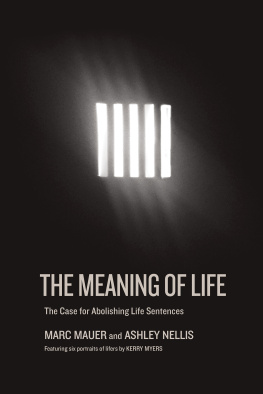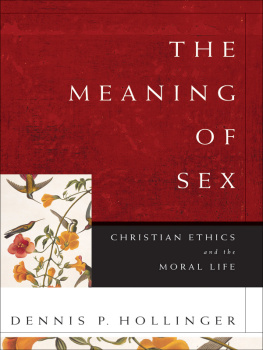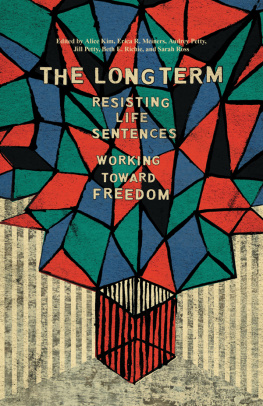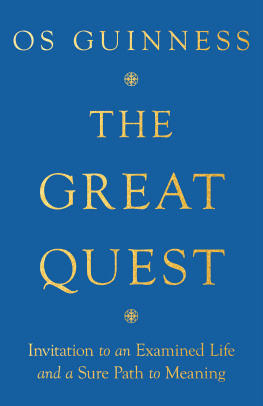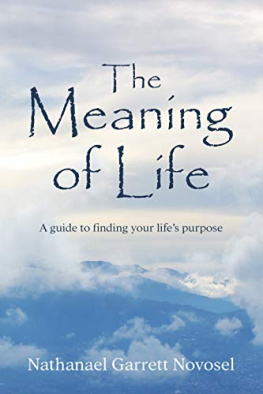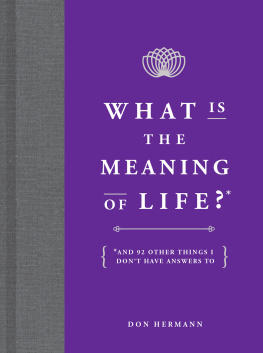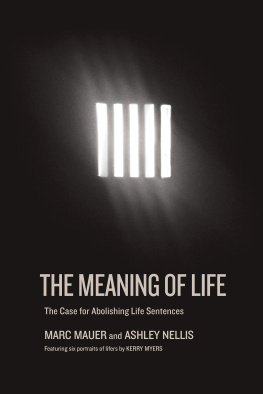Contents
Page List
Guide

The Meaning of Life
ALSO BY MARC MAUER
Race to Incarcerate
Race to Incarcerate:
A Graphic Retelling (with Sabrina Jones)
Invisible Punishment:
The Collateral Consequences of Mass Imprisonment (edited with Meda Chesney-Lind)
ALSO BY ASHLEY NELLIS
A Return to Justice: Rethinking Our
Approach to Juveniles in the System
The Meaning of Life
THE CASE FOR ABOLISHING LIFE SENTENCES
Marc Mauer and Ashley Nellis
Featuring six portraits of lifers
by Kerry Myers

2018 by Marc Mauer and Ashley Nellis
Portraits of lifers 2018 by Kerry Myers
All rights reserved.
No part of this book may be reproduced, in any form, without written permission from the publisher.
Requests for permission to reproduce selections from this book should be mailed to: Permissions Department, The New Press, 120 Wall Street, 31st floor, New York, NY 10005.
Parts of chapter 7, The Racial Meaning of Life, reproduced with permission from Marc Mauer and Ashley Nellis, The Impact of Life Imprisonment on Criminal Justice Reform in the United States, Dirk van Zyl Smit and Catherine Appleton, eds., 2016, Life Imprisonment and Human Rights, Hart Publishing, an imprint of Bloomsbury Publishing Plc.
Photograph of Willis X. Harris on page 169 by Alan Pogue.
Published in the United States by The New Press, New York, 2018
Distributed by Two Rivers Distribution
ISBN 978-1-62097-409-4 (hc)
ISBN 978-1-62097-410-0 (ebook)
CIP data is available
The New Press publishes books that promote and enrich public discussion and understanding of the issues vital to our democracy and to a more equitable world. These books are made possible by the enthusiasm of our readers; the support of a committed group of donors, large and small; the collaboration of our many partners in the independent media and the not-for-profit sector; booksellers, who often hand-sell New Press books; librarians; and above all by our authors.
www.thenewpress.com
Composition by dix!
This book was set in Fairfield LH
Printed in the United States of America
24681097531
In memory of Barbara Cartwright and Ahmad Rahman, my mentors and friends
MM
To Ruthie and Twyla, who light up my world
AN
It is said that no one truly knows a nation until one has been inside its jails. A nation should not be judged by how it treats its highest citizens, but its lowest ones.
NELSON MANDELA
Contents
The Meaning of Life
Introduction
Lessons of The Birdman
In the early part of the last century, Robert Stroud was considered one of the most notorious and dangerous individuals in the U.S. prison system. Born in Seattle, Stroud ran away from his abusive father at the age of thirteen. He settled in Alaska and became a pimp by the age of eighteen. In 1911, he was convicted of the brutal murder of a bartender who had allegedly not paid for the services of one of his prostitutes, and was sentenced to twelve years in prison.
In federal prison, Stroud on various occasions stabbed other prisoners and attacked a hospital orderly. After being transferred to Leavenworth Federal Penitentiary, he got into an altercation in 1916 with a guard over a violation that would have prohibited a prison visit from his brother. In retaliation he fatally stabbed the guard in the prison cafeteria in front of 1,100 prisoners. He was convicted of the murder and sentenced to death by hanging, but in 1920 he received a commutation of sentence to life without parole from President Woodrow Wilson.
The name of Robert Stroud is not familiar to very many Americans today, but many more know of his fame as the Birdman of Alcatraz, played by Oscar-nominated Burt Lancaster in the 1962 film. Shortly after receiving his sentence commutation, Stroud came across an injured sparrow in the Leavenworth prison yard and took it back to his cell for care. Over time he collected three hundred canaries and, with the support of prison officials, studied their behavior in the adjoining prison cells that became his laboratory. His observations over many years led him to author two well-regarded books on canaries and to develop expertise on their diseases and treatment. Crime reporter Carl Sifakis regarded Stroud as possibly the best-known example of self-improvement and rehabilitation in the U.S. prison.
Robert Strouds personal transformation over time was remarkable and a testament to the ability of the human spirit to thrive under adverse circumstances. But it also raises fundamental questions about sentencing, redemption, and predicting human behavior, particularly in regard to those who have committed great harm to others.
On the day of his sentencing for murder in 1911 neither the judge nor anyone else in the courtroom would have thought that Robert Stroud would someday gain a national reputation as a contributor to scientific inquiry. Nor would anyone have thought that possible at the sentencing for his second murder, or at any time during his first decade of imprisonment.
And yet Robert Stroud clearly possessed the human capacity for transformation, in his case triggered by the simple act of caring for a wounded bird. Other people experience such transformations through the aid of a gifted teacher, the caring of a loved one, or a book that opens ones mind to new experiences and insights.
Sentences of life imprisonment are imposed for various reasons related to public safety and upholding societal values. To the extent that these goals are based on assumptions of future behavior, we should reflect on the difficulty of making such predictions. This does not suggest that every person convicted of a serious crime will turn out to be a Robert Stroud, but neither does it suggest that no one will overcome their transgressions.
American society is now at a moment of growing concern about the challenge of mass incarceration, a development described by many as the civil rights issue of the twenty-first century. Critical voices span the political spectrum, and increasingly we hear calls for a substantial reduction in the prison population over the next decade. Many states and the federal government have enacted reforms designed to produce better outcomes for people returning home from prison or to avoid sentencing people to prison in the first place. But while a handful of states have achieved substantial reductions in their prison populations, the overall pace of decline is still quite modest, particularly when viewed against the nearly four-decade buildup of the prison system.
Many factors explain both the massive expansion of the prison system and the relatively modest pace of decarceration today. One of the most significant is the severity of punishment imposed on people sentenced to prison. Along with the death penalty, the broad use of life imprisonment is perhaps the most distinctive aspect of the American punishment system in relation to other industrialized nations. One of every seven people in prison in the United Statesa total of more than two hundred thousand peopleis currently serving a life prison term, more than the entire prison population in 1972, before the advent of mass incarceration. This includes those serving life without the possibility of parole, those with the possibility of parole, and virtual lifers, as defined by a sentence of fifty years or more.

